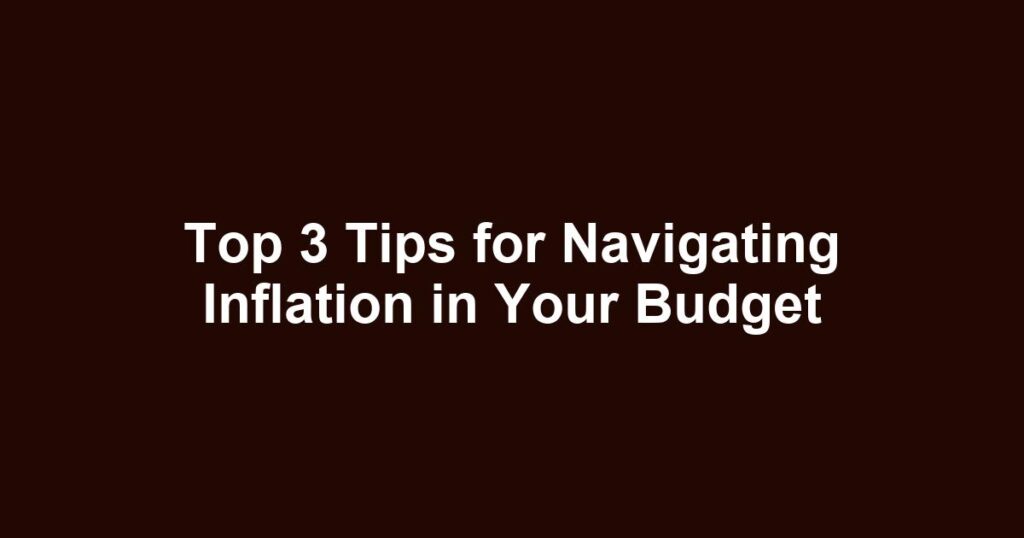Top 3 Tips for Navigating Inflation in Your Budget
Inflation is an economic phenomenon that affects everyone, making it increasingly important to manage your finances wisely. When prices rise, it’s crucial to adapt your budgeting strategies to ensure you can maintain your lifestyle and savings goals. In this article, we’ll discuss three essential tips for navigating inflation in your budget, providing practical steps to enhance your personal finance management.
Understanding Inflation
Before diving into budgeting tips, let’s explore what inflation really means. Inflation refers to the rate at which the general level of prices for goods and services rises, leading to a decrease in purchasing power. When inflation rates increase, consumers find that their money buys less than it used to. Understanding inflation is key to making informed financial decisions.
Why Does Inflation Matter in Budgeting?
- Inflation reduces the value of money over time.
- It can increase costs of essentials such as food and fuel.
- Higher inflation rates can affect savings and investment returns.
Being aware of these factors will help you adjust your budgeting strategies effectively. So, let’s get into the top three tips for managing inflation in your budget.
Tip 1: Revise Your Budget Regularly
One of the most important aspects of adapting to inflation is revisiting your budget frequently. Here’s how to do it:
Set a Regular Schedule
Consider setting aside a specific time each month to review your finances. This helps you stay on top of changes in expenses and income. During your review, consider the following:
- Are your expenses increasing? Keep a record of price changes in essential items.
- Is your income keeping pace with inflation? Assess if you need to request a raise or explore additional income sources.
Adjust Your Categories
It’s important to adjust your budget categories in response to inflation. For example:
- Increase your food budget if grocery prices are climbing.
- Consider adding or expanding a transportation category if gas prices rise.
By keeping your budget aligned with real-world expenses, you can maintain better control over your personal finance and prevent overspending.
Tip 2: Focus on Smart Spending
As inflation impacts broad sectors of the economy, being strategic about your spending can help mitigate its effects. Here are some ways to implement smart spending habits:
Prioritize Needs Over Wants
In times of inflation, it’s essential to distinguish between essential and non-essential expenses. Here’s how to prioritize:
- Necessities: These include staples like food, utilities, and housing costs. Ensure these are covered before allocating money for luxuries.
- Wants: These might consist of dining out, entertainment, or luxury items. Consider delaying purchases on these until your financial health stabilizes.
Embrace Budget-Friendly Strategies
Consider these practical ways to stretch your budget:
- Utilize coupons and take advantage of sales for essential and non-essential items.
- Buy in bulk when possible, especially for non-perishable goods.
- Shop at discount stores or consider alternative brands that may be more affordable.
Evaluate Subscription Services
In today’s digital world, subscriptions can pile up quickly. Take a moment to evaluate:
- Which subscriptions do you actually use?
- Are there cheaper alternatives?
By reviewing and potentially cutting back on subscriptions, you can free up funds in your budget to cope with rising costs.
Tip 3: Build a Financial Cushion
Having a financial cushion is vital in an inflationary environment. Here’s how to safely build your savings:
Create an Emergency Fund
Emergencies can happen at any time, and with inflation, it’s crucial to have funds set aside. Aim for:
- Three to six months’ worth of living expenses saved in a separate account.
- Regular contributions, even if small, to create a habit of saving.
Invest Wisely
Keeping cash isn’t always the best option during inflationary periods. Instead, consider:
- Investing in assets that traditionally outpace inflation, such as stocks, bonds, or real estate.
- Researching inflation-protected securities, like Treasury Inflation-Protected Securities (TIPS).
Evaluate High-Interest Debt
Inflation can erode purchasing power, but high-interest debt can also drain your finances. Work on:
- Paying down credit card debt, focusing on the highest-interest accounts first.
- Considering refinancing options for existing debts to lower your interest rates.
Frequently Asked Questions
How does inflation affect my budgeting strategy?
Inflation can increase your living costs. Regularly revising your budget, focusing more on your essentials, and building a financial cushion can help your budgeting strategy stay effective during inflationary periods.
What should I do if my income isn’t keeping up with inflation?
If your income isn’t keeping pace with inflation, consider discussing a raise with your employer or looking for additional income sources, such as side gigs or freelance work.
Why is it important to build an emergency fund during inflation?
Having an emergency fund acts as a financial safety net, helping you handle unexpected expenses without resorting to high-interest debt, which can worsen your financial situation during inflation.
Final Thoughts
Navigating inflation in your budget doesn’t need to be overwhelming. By regularly reviewing your finances, smartly prioritizing your spending, and building a financial cushion, you can stay ahead of inflation and maintain control over your personal finance. These strategies not only safeguard your budget but also position you for greater financial stability in the long run.
Are you ready to take charge of your budgeting strategies? Start implementing these tips today and watch your financial confidence soar!

